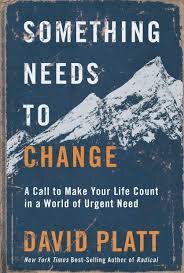Dispatches from the Front - A Review
If you watch the news, listen to the radio, and read the usual blogs it is easy to forget a simple fact: God is on the move and the gospel will be triumphant.
Tim Keesee’s 2014 book, Dispatches from the Front, is a reminder that the light of life has the power to penetrate the darkness in a million places in the world. The power of salvation, which is made plain in the story of Christ’s life, death, burial and resurrection, is not dependent upon the perfect political conditions, but upon the message going forth and the sovereign choice of an omnipotent God.
Dispatches from the Front bears the subtitle, “stories of gospel advance in the world’s difficult places.” Though some readers might think that the subtitle refers to progress in suburban homes in the US, it actually refers to the advance of the gospel in the places where Christianity makes believers social and political outsiders. The good news about the good news is that God is on the move.
Keesee gives the reader snippets from his travels with Frontline Missions International, which was formed to get the gospel to hard-to-reach places in the world. We don’t see the months and years of plowing and tilling that went into some of the conversions, but we get to read about the baptisms, the equipping of pastors, and the growth of the gospel. There may be, for some, a danger of romanticism about getting on a plane, handing out a few tracts, and seeing communities flock to Christ. That can happen, but that is not the story behind most of these stories.
The stories Keesee presents are vitally important as an encouragement because it is a reminder that the Church will not stand or fall based on the party in power or the irrational laws that are enacted.
The book is arranged geographically. It begins in the former Soviet Bloc, then moves to the Balkans. In the next chapter Keesee travels through China with the following one detailing God’s work in Southeast Asia. Chapter Five presents the gospel advance in Bangladesh, India, and Pakistan, with the sixth chapter detailing some events from Liberia, Sierra Leone, and Guinea. The final two chapters offer the hopeful signs of renewal in the horn of Africa and Egypt, closing with Afghanistan and Iraq.
Each of these dispatches—quick vignettes of the gospel bearing fruit and increasing—reminds readers that we have a supernatural God who works in mighty ways to accomplish his vital work in the world. For the pastor weighed down by the constant bickering about pandemic protocols, selfishness of congregations, and mundane arrangements of life in the US, this book offers a vitamin shot of encouragement about the way God can work in hard places. For the average Christian whose vision of the faith is limited to a service that can be squeezed in between travel league games and vacations, this will reveal Christian faith that energizes all of life.














Reading your Bible is a battle. There’s a reason why Paul lists Scripture as the sword of the Spirit in his discussion of the armor of God (Eph. 6:17). More even than that, Scripture reveals God’s character and is, thus, central to worshiping well (Psalm 119). That’s why reading the Bible is a battle.